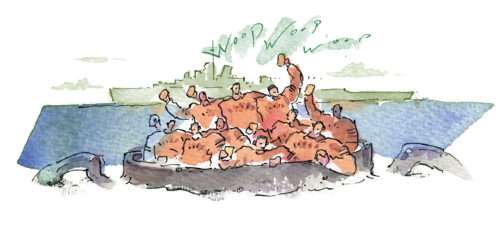
– Illustration by Malcolm Jones –
The Royal Canadian Navy racked up an admirable record in the Second World War, but one of its triumphs is little known. While the navy was battling U-boats in the Atlantic Ocean and aiding in the D-Day landings, it also managed to win the Grey Cup. Yes, that Grey Cup.
In 1944, for reasons that are vague, navy brass decided to organize a football team from two Montreal establishments, the naval reserve division HMCS Donnacona and the communications training school HMCS St. Hyacinthe.
John Crncich, who played for the team—known as the St. Hyacinthe-Donnacona Navy or the Navy Combines—said it was a Cinderella outfit.
“They formed a team of football, got into a league that might and, eventually, did vie for the Grey Cup and as it turned out, to everybody’s surprise, we went on and, we did win the Grey Cup, against all the odds in the world.”
The navy won the cup on Nov. 25, 1944, defeating Hamilton Wildcats 7-6.
Crncich said the team drew a variety of sailors to its roster. Some were fresh home from the D-Day landings, others were recruits. The team found its burly linemen among the ranks of the shore patrol, which made for some stress in the dressing room.
“You got to meet those guys off the football field when you were in the dance halls or somewhere on a Friday night and a fight broke out,” Crncich recalled. “They would be charging in there with their clubs over your head. The next day, you were on the field with them.”
Crncich said the brass seemed embarrassed at the unexpected victory and suggested the cup be returned.
“To their credit, the Canadian Rugby Union, which administered the Grey Cup at that time, said, ‘No, they won it fair and square. You keep it.’”
Crncich played in the Canadian Football League after the war and died in 2019.
Some military common sense:
If orders can be misunderstood, they will be.
If you need an officer in a hurry, take a nap.
Professionals are predictable; it’s the amateurs who are dangerous.
If you want an effective staff, find the one or two people who aren’t complete morons and work them until they drop.
If at first you don’t succeed, then bomb disposal probably isn’t for you.
A navy veteran was asked why he chose that service:
“Well, in the navy, at least you know where you’re going to sleep at night. Maybe not in the army and maybe not in the air force.”
Another navy veteran of the Second World War moved from the merchant marine to a corvette. He found a lot of differences.
“In the merchant navy, we had cabins, two men to a cabin. When I joined the navy, we went aboard the ship and I asked a leading hand, who was supposed to take us and show us around, where was our cabin at. He said, ‘Do you see them bars up there?’ I said, ‘Yeah.’ And he said, ‘That’s your cabin. That’s where you hang your hammock.
“And there were more mealtimes than meals. When the weather was bad in the North Atlantic, they just gave you a can of strawberry jam and a couple of cans of sardines and that’s what you ate.”
From the service rivalry file comes this from a retired army fellow:
“The air force doesn’t like to have meetings on Wednesday. It ruins both weekends.”
Mel Hill of Vancouver was a wartime navigator in the Royal Canadian Air Force. He found himself taking courses at an isolated camp in Wales. The camp was filled with Canadians and Australians, which caused some disciplinary headaches for the commanding officer.
One day, he came up with the idea of staging an escape and evasion exercise. The plan was to have the participants wear plain overalls with no wallets or identity cards. They would be dropped at a random distance from the camp and would have to make their way back without being caught by military police patrols or regular police, who were notified to watch for them.
Hill and two companions were duly deposited in the middle of nowhere. After a few miles on foot, they spied a milk delivery van parked by the side of the road while the driver made his rounds.
They figured they were supposed to be in enemy territory, so why not? They stole the truck.
“I couldn’t figure out the gear shift. But once I started to move, the last thing I remember was the milkman running down the path toward this truck screaming, ‘Hoy, hoy!’ and we took off.”
The vehicle had solid rubber tires, which made for a bumpy ride. As they jolted along the rutty farm roads, the lids popped off the milk cans, leaving Hill and his buddies sodden.
They eventually made their way into familiar territory, ditched the truck, and walked about two miles to the camp. The commanding officer was amazed at their early return (the exercise was supposed to last two days), but they still were rewarded with a bottle of scotch.
Subsequently, however, changes were made in the procedures.
“The next escape exercise, there were all sorts of rules,” Hill said. “You couldn’t swipe a bicycle, you couldn’t steal trucks, you couldn’t do this, you couldn’t do that.”
Advertisement










